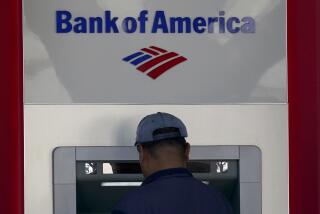IPO Abuse Probe Ends With Huge Settlement
- Share via
Credit Suisse First Boston has agreed to pay $100 million to settle an investigation by federal regulators into the firm’s handling of initial public stock offerings during the late 1990s stock boom, a source said Friday.
The payment to the Securities and Exchange Commission and the National Assn. of Securities Dealers includes a penalty of $30 million--the second-highest civil fine ever paid by a Wall Street brokerage--and the disgorgement of $70 million in profit from IPO deals, the source said.
Settlement of the case probably closes the book on one of the most controversial parts of a broad investigation of IPO practices during the technology-stock frenzy, when brokerage firms and their preferred clients made huge profits but individual investors often incurred stinging losses. The CSFB case received the most attention, in part because of the firm’s huge profit as one of the leading underwriters of tech offerings. The SEC is continuing a separate IPO probe against other major brokerages.
CSFB succeeded in avoiding any allegations of civil securities fraud. Fraud charges could have made the firm vulnerable to IPO-related lawsuits filed by individual investors and could have affixed a professional stigma.
Instead, the firm agreed to settle charges that it violated SEC record-keeping rules, as well as separate NASD regulations, including that CSFB improperly shared in the profits of its customers.
“It doesn’t arm the plaintiffs in the private litigation,” said John Coffee, a Columbia University securities law professor. “They’re not really helped by this settlement.”
In settling the case, CSFB will neither admit nor deny wrongdoing.
Officials at CSFB, the SEC and NASD could not be reached for comment late Friday. The SEC will formally disclose the settlement Tuesday.
The settlement grew out of a broad investigation by securities regulators into how Wall Street firms distributed IPO shares during the technology-stock boom of the late 1990s. The 18-month probe examined whether the securities unit of Zurich-based Credit Suisse Group charged excessive commissions to institutional investors who sought shares of coveted IPOs, and whether those payments amounted to kickbacks.
Sources have previously said the SEC is conducting a parallel probe into whether other brokerage firms manipulated IPO prices by forcing customers who received IPO shares to buy additional more stock once formal trading began. This settlement does not affect the second investigation.
The SEC probably agreed not to bring fraud charges because it could have been difficult to prove that any excessive commissions harmed investors, Coffee said. The institutional investors paying the commissions obviously were willing to do so. And because IPO shares routinely soared, the companies going public were probably aware that their IPOs were underpriced, he said.
Individual investors have charged in their private lawsuits that the secret payments amounted to stock manipulation that hurt them. Many small investors paid astronomical prices to buy IPO shares on their first day of trading.
But proving damage to small investors could have been difficult, Coffee said. If CSFB were to have revealed the hidden payments to individuals, it probably would have increased their interest in the IPOs rather than frightened them away, he said.
Such a disclosure “doesn’t tell you, ‘This company is shaky,’” Coffee said. “It tells you, ‘Sophisticated people who know more than I know are willing to pay an awful lot of money to get this allocation. This sounds like this [stock] might stay hot.’”
The U.S. attorney’s office in Manhattan considered bringing criminal charges against CSFB but decided late last year not to do so.
In terms of penalties paid by brokerages, the $30-million penalty would be surpassed only by the $122-million payment by Salomon Bros. in 1992 for its role in a scandal involving the auctioning of Treasury securities. The $100-million total payment would rank as the fifth-largest settlement of SEC charges by a brokerage firm.
More to Read
Inside the business of entertainment
The Wide Shot brings you news, analysis and insights on everything from streaming wars to production — and what it all means for the future.
You may occasionally receive promotional content from the Los Angeles Times.









